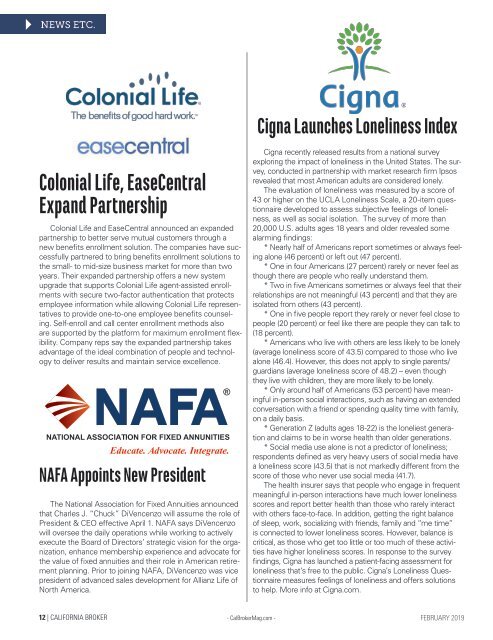CALIFORNIA BROKER Vol. 37, Number 5
You also want an ePaper? Increase the reach of your titles
YUMPU automatically turns print PDFs into web optimized ePapers that Google loves.
NEWS ETC.<br />
Cigna Launches Loneliness Index<br />
Colonial Life, EaseCentral<br />
Expand Partnership<br />
Colonial Life and EaseCentral announced an expanded<br />
partnership to better serve mutual customers through a<br />
new benefits enrollment solution. The companies have successfully<br />
partnered to bring benefits enrollment solutions to<br />
the small- to mid-size business market for more than two<br />
years. Their expanded partnership offers a new system<br />
upgrade that supports Colonial Life agent-assisted enrollments<br />
with secure two-factor authentication that protects<br />
employee information while allowing Colonial Life representatives<br />
to provide one-to-one employee benefits counseling.<br />
Self-enroll and call center enrollment methods also<br />
are supported by the platform for maximum enrollment flexibility.<br />
Company reps say the expanded partnership takes<br />
advantage of the ideal combination of people and technology<br />
to deliver results and maintain service excellence.<br />
NATIONAL ASSOCIATION FOR FIXED ANNUNITIES<br />
Educate. Advocate. Integrate.<br />
NAFA Appoints New President<br />
The National Association for Fixed Annuities announced<br />
that Charles J. “Chuck” DiVencenzo will assume the role of<br />
President & CEO effective April 1. NAFA says DiVencenzo<br />
will oversee the daily operations while working to actively<br />
execute the Board of Directors’ strategic vision for the organization,<br />
enhance membership experience and advocate for<br />
the value of fixed annuities and their role in American retirement<br />
planning. Prior to joining NAFA, DiVencenzo was vice<br />
president of advanced sales development for Allianz Life of<br />
North America.<br />
Cigna recently released results from a national survey<br />
exploring the impact of loneliness in the United States. The survey,<br />
conducted in partnership with market research firm Ipsos<br />
revealed that most American adults are considered lonely.<br />
The evaluation of loneliness was measured by a score of<br />
43 or higher on the UCLA Loneliness Scale, a 20-item questionnaire<br />
developed to assess subjective feelings of loneliness,<br />
as well as social isolation. The survey of more than<br />
20,000 U.S. adults ages 18 years and older revealed some<br />
alarming findings:<br />
* Nearly half of Americans report sometimes or always feeling<br />
alone (46 percent) or left out (47 percent).<br />
* One in four Americans (27 percent) rarely or never feel as<br />
though there are people who really understand them.<br />
* Two in five Americans sometimes or always feel that their<br />
relationships are not meaningful (43 percent) and that they are<br />
isolated from others (43 percent).<br />
* One in five people report they rarely or never feel close to<br />
people (20 percent) or feel like there are people they can talk to<br />
(18 percent).<br />
* Americans who live with others are less likely to be lonely<br />
(average loneliness score of 43.5) compared to those who live<br />
alone (46.4). However, this does not apply to single parents/<br />
guardians (average loneliness score of 48.2) – even though<br />
they live with children, they are more likely to be lonely.<br />
* Only around half of Americans (53 percent) have meaningful<br />
in-person social interactions, such as having an extended<br />
conversation with a friend or spending quality time with family,<br />
on a daily basis.<br />
* Generation Z (adults ages 18-22) is the loneliest generation<br />
and claims to be in worse health than older generations.<br />
* Social media use alone is not a predictor of loneliness;<br />
respondents defined as very heavy users of social media have<br />
a loneliness score (43.5) that is not markedly different from the<br />
score of those who never use social media (41.7).<br />
The health insurer says that people who engage in frequent<br />
meaningful in-person interactions have much lower loneliness<br />
scores and report better health than those who rarely interact<br />
with others face-to-face. In addition, getting the right balance<br />
of sleep, work, socializing with friends, family and “me time”<br />
is connected to lower loneliness scores. However, balance is<br />
critical, as those who get too little or too much of these activities<br />
have higher loneliness scores. In response to the survey<br />
findings, Cigna has launched a patient-facing assessment for<br />
loneliness that’s free to the public. Cigna’s Loneliness Questionnaire<br />
measures feelings of loneliness and offers solutions<br />
to help. More info at Cigna.com.<br />
12 | <strong>CALIFORNIA</strong> <strong>BROKER</strong> - CalBrokerMag.com -<br />
FEBRUARY 2019

















